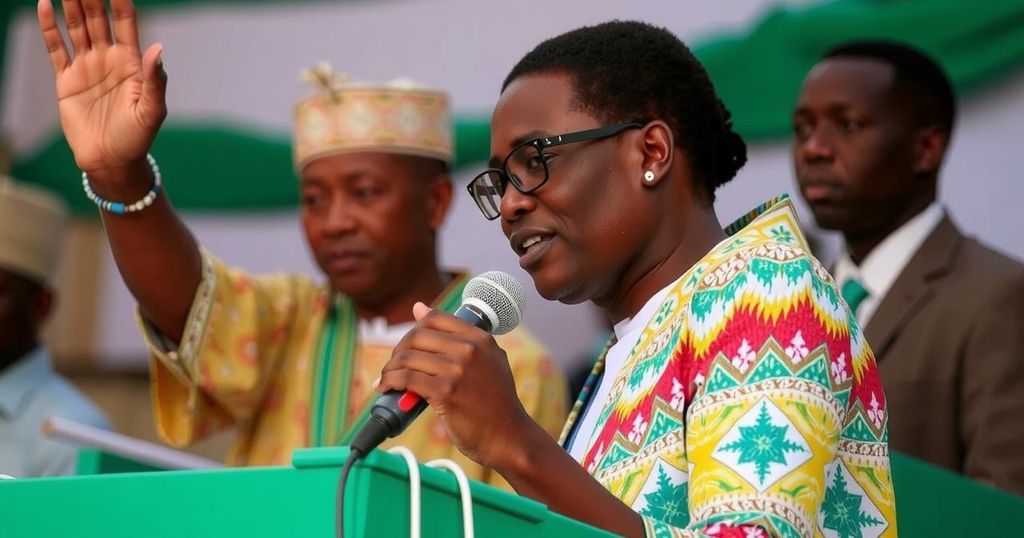World news
ACCRA, AFRICA, AKUFO - ADDO, BAWUMIA, DEMOCRACY, ELECTION, ELECTORAL PROCESS, GHANA, GOVERNANCE, GOVERNMENT, INTERIOR MINISTRY, JAMES NSIAH, JAMESTOWN, JOHN MAHAMA, MAHAMUDU BAWUMIA, NANA AKUFO - ADDO, NATIONAL DEMOCRATIC CONGRESS, NDC, NORTH AMERICA, NPP, OPPOSITION, UNITED STATES, WEST AFRICA
Sofia Rodriguez
0 Comments
Ghana Votes Amid Economic Challenges in Tight Presidential Election
Ghana votes in a competitive presidential election with Vice President Mahamudu Bawumia and former President John Mahama as leading candidates. Economic issues, including debt and inflation, dominate voter concerns. The ruling NPP seeks to achieve a third term, while the NDC aims to capitalize on public dissatisfaction. The results are eagerly anticipated in a politically significant election.
On Saturday, Ghanaians participated in presidential and parliamentary elections, with Vice President Mahamudu Bawumia and former President John Mahama as the leading candidates. The elections were held amidst Ghana’s challenging economic backdrop, marked by a significant debt default and soaring inflation. Outgoing President Nana Akufo-Addo is completing his two-term limit, setting the stage for a crucial political shift in the country, primarily influenced by economic concerns.
Both candidates are vying to address the pressing issues faced by citizens, such as unemployment and the high cost of living. The ruling New Patriotic Party (NPP), under Bawumia’s leadership, seeks to achieve an unprecedented third term, while Mahama’s National Democratic Congress (NDC) hopes to capitalize on discontent regarding the current administration’s economic performance. The distinct narratives presented by the candidates reveal divergent approaches to revitalizing the economy.
Bawumia, a UK-educated economist, expressed optimism about the elections, stating, “I am very hopeful of winning this election. I think we have done a lot of work with our message to the people and the message has been well received.” His proposals emphasize ongoing digitalization initiatives, educational reforms, and health programs to improve the economic landscape. Conversely, Mahama promises to “reset” Ghana’s economy, introducing a “24-hour economy” aimed at increasing job creation and production.
The voting process concluded at 1700 GMT, with preliminary election results anticipated on Sunday and full presidential outcomes expected by Tuesday. Voter sentiments reflect a desire for change, with many expressing frustration over difficult economic conditions. The elections not only highlight the candidates’ differing visions but also underscore the critical importance of addressing the economic realities Ghanaians are facing today.
Additionally, the closure of all land borders was implemented over the election period to ensure security during voting, demonstrating the government’s commitment to safeguarding the electoral process. As the results unfold, the implications for Ghana’s political future and economic recovery will be closely scrutinized.
Ghana is currently grappling with significant economic challenges, including a recent debt crisis that led to a default and negotiations with the International Monetary Fund (IMF) for assistance. The country’s high inflation rates and unemployment have heightened public concern, making economic recovery a central issue in the elections. Historical political stability, characterized by a alternation of power between the NPP and NDC since 1992, adds to the critical significance of this election. As both candidates originate from the northern region, traditionally associated with the NDC, this factor could influence election outcomes in a region that is evolving politically. The candidates’ contrasting backgrounds and platforms frame a competitive electoral landscape prominently focused on economic rejuvenation and governance reform.
The presidential election in Ghana has unfolded under the shadow of economic uncertainty, with Vice President Mahamudu Bawumia and former President John Mahama competing in a highly charged atmosphere. Voter frustration with the current economic conditions has given rise to a contentious election, underscoring the importance of effective governance and strategic economic policies. As both parties present divergent paths forward, the outcome will significantly impact Ghana’s socio-economic landscape and political climate heading into the next term.
Original Source: www.france24.com




Post Comment